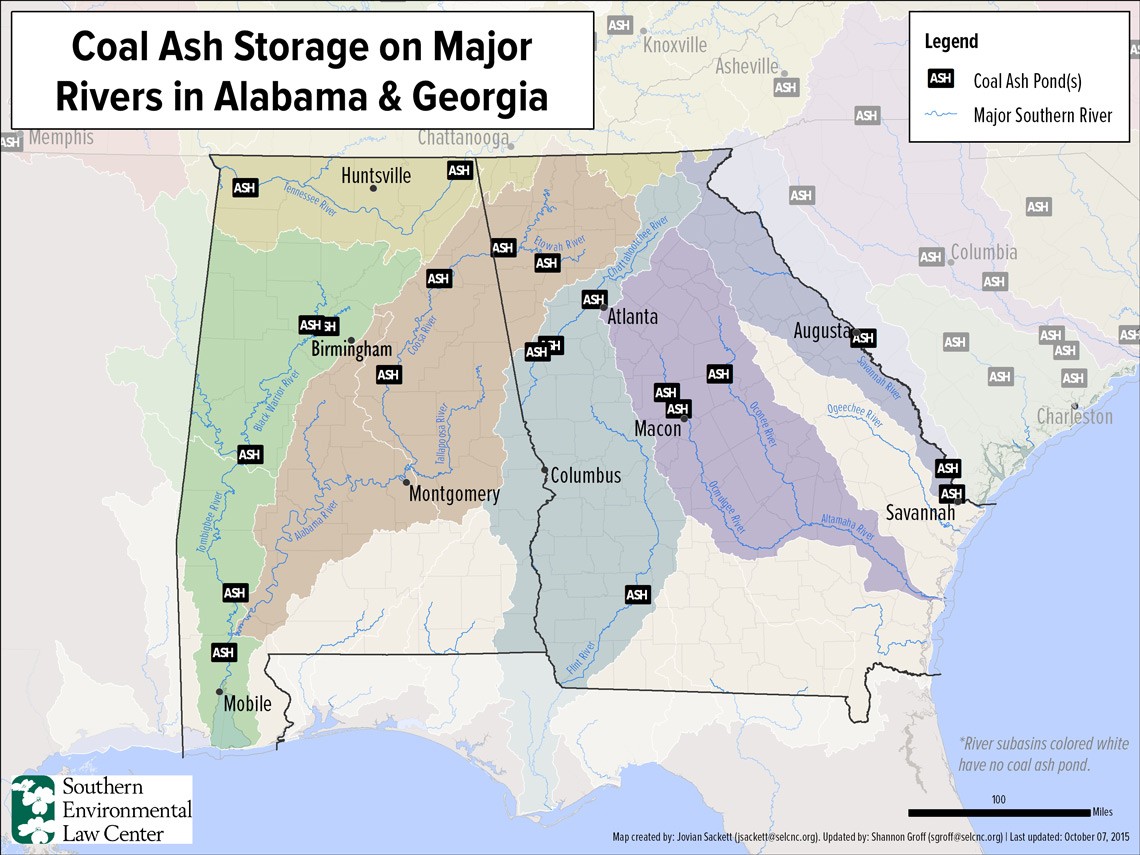
This article is posted with permission of the Southern Environmental Law Center (SELC). Click here to see their original post. SELC represents SACE in several coal ash related legal cases.
Georgia Power and Alabama Power have announced plans to close their respective coal ash storage ponds, though both utilities remain tight-lipped on the specifics of those closure plans. The announcements come as the utilities face deadlines under the new federal coal ash regulations unveiled earlier this year.
Georgia Power’s plans are expected to address the 29 coal ash impoundments at 11 coal-fired power plants across the state of Georgia, while Alabama Power must deal with the waste in 16 ash ponds from six coal-fired power plants in Alabama.
Coal ash is a byproduct of burning coal and contains a number of harmful contaminants like arsenic, selenium, mercury and lead. For decades, utilities have typically stored this waste in wet form in large unlined impoundments. Those impoundments, like the coal plants they serve, are often located immediately adjacent to major rivers, lakes and streams.
Because the impoundments are unlined, there is no barrier to protect the underlying groundwater, and surrounding surface waters, from the seepage of coal ash contaminants. Coal ash impoundments also present an ever-present risk of structural failure because they are generally contained only by earthen dams.
In several high-profile catastrophes those dams have given way, unleashing severe economic and environmental harm on downstream communities. The massive coal ash spills at the Tennessee Valley Authority’s Kingston Fossil Plant in 2008, and Duke Energy’s Dan River plant in North Carolina in 2014 were the result of structural failures.
Utilities in South Carolina have begun eliminating these risks by excavating the coal ash and moving it to lined, dry storage away from waterways. In the wake of the Dan River disaster, Duke Energy has likewise announced plans to move coal ash to lined storage at several of its North Carolina sites.
This is the safest option for protecting public health and the environment, and utilities in the Carolinas are demonstrating it to be feasible and cost-effective. It is the standard that should be followed in handling Georgia’s ash ponds, said Senior Attorney Kurt Ebersbach in an interview on Atlanta’s NPR station WABE. (Listen to the full WABE interview here.)
Unfortunately, EPA’s coal ash regulations do not mandate this result but instead allow for “cap-in-place”, a practice that amounts to “pollute-in-place” as it does nothing to protect groundwater from continuing coal ash pollution.
Neither Georgia Power nor Alabama Power – both Southern Company subsidiaries – have released timetables for the closures, nor have they provided details on how the large volumes of ash will be handled.
“The question is not whether these utilities will do the bare minimum, it’s will they do the right thing?” said Ebersbach. “The EPA rule is a set of minimum standards. Utilities in the Carolinas are leading the way by doing more. Georgia Power and Alabama Power should follow their lead and eliminate the risks of coal ash pollution once and for all.”
SELC uses the power of the law to champion all the things you love about the South: clean water, healthy air, mountains, forests, rural countryside, and the coast.